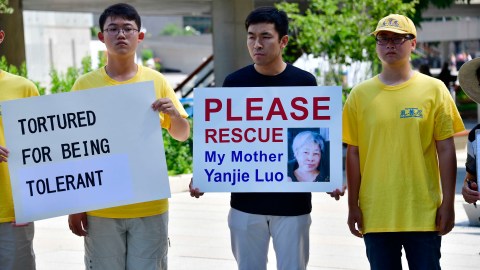China harvests organs from persecuted minorities, human rights group claims

Photo credit: Roberto Machado Noa / LightRocket via Getty Images
- The NGO China Tribunal accused China of killing persecuted minorities and harvesting thousands of organs from them.
- They recently presented their findings to the U.N. Human Rights Council.
- China has denied the large-scale harvesting of organs.
China has been accused of murdering and harvesting the organs of ethnic and other persecuted groups in the country.
Members of the NGO China Tribunal spoke before the United Nations Human Rights Council on Tuesday, September 24, claiming that the Chinese government was responsible for purloining thousands of essential organs — hearts, kidneys, and lungs — from members of the Falun Gong religious sect and Uighur Muslims.
China Tribunal accusations to UN Human Rights Council
A senior lawyer of the group, Hamid Sabi, called on the U.N. human rights body to investigate their evidence that implicates China in the murdering of Falun Gong spiritual group members for the harvesting of their organs for transplant.
Before the council, Sabi said:
“For years throughout China on a significant scale [the harvesting of organs]. . . and it continues today. . . Victim for victim and death for death, cutting out the hearts and other organs from living, blameless, harmless, peaceable people constitutes one of the worst mass atrocities of this century.”
Sabi also mentioned that detainees from the ethnic Uighur minority were also targeted. “Here is a duty on those who have the power to institute investigations for, and proceedings at, international courts or at the U.N. to test whether Genocide has been committed,” China Tribunal’s final report reads.
Beijing has denied the accusations that it is rounding up persecuted groups and forcibly taking their organs. It also stated that it stopped using organs from executed prisoners back in 2015. However, China Tribunal’s higher-ups claim that there was a substantial number of prisoners killed by the Chinese government:
“The Tribunal’s members are certain — unanimously, and sure beyond reasonable doubt — that in China forced organ harvesting from prisoners of conscience has been practiced for a substantial period of time involving a very substantial number of victims.”
The tribunal and report was led by Sir Geoffrey Nice, a British lawyer that was the lead lead prosecutor in the trial of former Yugoslavian president, Slobodan Milosevic.”
Currently, the group’s members are calling for further investigations and proceedings.
Persecuted ethnic groups and minorities
The Falun Gong is a spiritual meditation group that was banned in China over 20 years ago after 10,000 of their members led a silent protest in a leadership compound in Beijing. Since then, thousands of members have been imprisoned.
Sir Geoffrey Nice, the tribunal’s chairman, spoke at a separate U.N. event stating that those involved in the transplant surgery foreign market could no longer discredit this “inconvenient evidence.”
Transplant recipients usually include Chinese nationals and overseas patients who come to China so that they can receive an organ with a reduced waiting time, although at a much higher cost.
The tribunal concluded their findings by saying that:
“Governments and any who interact in any substantial way with the PRC […] should now recognize that they are, to the extent revealed above, interacting with a criminal state.”
China has been successfully squashing any international investigations into their systematic surveillance and rounding up of Uighurs into re-education camps. Diplomats, and even journalists, have allegedly been reluctant to go public after witnessing the problems firsthand.
China contends that its detention camps are there to fight Islamist extremism. Beijing calls these places boarding schools and explains that all of the detainees are voluntarily there.
If what the China Tribunal has found is, indeed, true, then this is could be one of the worst atrocities imaginable being committed by a nation state in this day and age.





